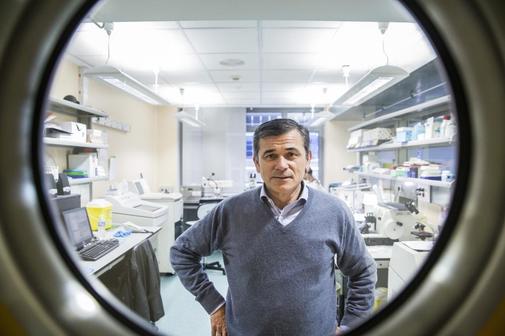- Anemia of Fanconi. This is the first Spanish trial of gene therapy
It has taken 20 years of research and the occasional failed attempt, but for the first time a clinical trial supports the efficacy of gene therapy to combat Fanconi anemia. And in this case it is a Spanish success. The group led by Juan Bueren, from the Center for Energy, Environmental and Technological Research (CIEMAT), has just published in the journal Nature Medicine the positive data of gene therapy in four children with this rare disease.
Fanconi anemia is a rare hereditary disease that causes a "bone marrow failure . " In 60% of cases worldwide - 80% in Spain - it appears due to a defect in the FANCA gene. Affected people stop producing blood cells (red blood cells, white blood cells, platelets) in sufficient quantity, which causes them anemia, hemorrhages and constant infections, and predisposes them to cancer, especially leukemia. At an early age, they begin to need various treatments, such as transfusions, and in the long run, a bone marrow transplant . But not all patients can have a donor, regardless of the fact that the bone marrow transplant is not without toxicity and risk.
Since the late 1990s, Bueren's team has investigated how to correct the defective gene that causes this disease. Those first experiments in mice now have a climax with these first four patients whose results are published. They are children who were treated with ages of four to seven and a half years . "We are very pleased to see that the long-term follow-up of patient data supports our proposal for gene therapy as an innovative and low-toxicity treatment for the hematological component of this devastating disease," says Juan Bueren.
The therapy begins with a procedure known as mobilization of the stem cells , a treatment with growth factors also devised by this group, so that the stem cells pass from the bone marrow to the blood and thus can be extracted from the patient.
Corrected cells
In a second phase, the genetic defect of the patient's cells is corrected with the help of a modified virus (lentivirus) that infects them, thus inserting the correct version of the gene. This is done throughout a day in a sterile room of CIEMAT, the CliniStem white room. Finally, the corrected cells were sent to the hospital to infuse them into the patient , which they receive without the need for any conditioning therapy such as that used in transplants with cells from a healthy donor. In this way, in a couple of days since the corrected cells are grafted, patients can be discharged.
"The results we present now are long-term: 18 months in the patient with less follow-up and 30 months in which more. We have verified that the corrected cells are grafted well in the patients and that over time they grow outnumbering the defective cells. In addition, the disease is stabilized: they stop losing blood cells and anemia, "says Paula Rio, a researcher at Ciemat and first signatory of the study, which also involves the Cyber Rare Diseases (CIBERER), the Niño Jesús Hospital in Madrid and the IIS of the Jiménez Díaz Foundation.
Gene therapy had a first chance in Fanconi anemia years ago in the United States with a series of trials that failed in part for "the viruses used (retroviruses)," says Rio, and for a culture of the cells in the laboratory that It lasted for several days, I would explain that the cells did not get to graft well in patients.
At the moment, the treatment that Spanish researchers have tried is restricted to experimental use in the clinical phase. "We plan to follow up on these patients, and others that we have included, over ten years," says Rio. In addition, in light of these results, the Spanish regulatory agency has authorized another trial to start gene therapy in patients as soon as the disease has been diagnosed, without waiting for symptoms to appear, "which could be applied to children around To one year".
According to the criteria of The Trust Project
Know more- Science and Health
SpaceTwo parachute failures threaten to postpone the ExoMars mission to Mars
Health The husband of a pregnant woman affected by listeriosis: "We passed listeria with paracetamol"
Warning Sanidad withdraws 'Advance' crutches from the market due to the risk of the user falling

